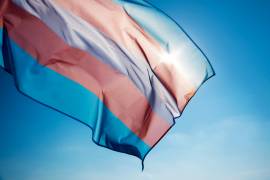
Human Rights Abuses of LGBT and HIV+ People in the U.S.
Blog Search
If all the world’s a stage, next year the United Nations will provide the critics.
In anticipation of the 2015 Universal Periodic Review (UPR), a comprehensive assessment of the human rights record of all UN member countries, Lambda Legal has authored a set of UPR comments surrounding the policing, detention and incarceration of LGBT people and people living with HIV. Below are some of our findings.
Policing practices lead to disproportionate and excessive incarceration of LGBT, gender-nonconforming and HIV-affected people.
LGBT people are exposed to police on the streets for a range of reasons, including family rejection, incompetent shelters, harassment and discrimination in schools (leading to truancy and dropout) and discrimination in accessing employment and in the workplace (contributing to unstable housing).
Once in the streets, LGBT people are disproportionately targeted by police, often profiled as sex workers – particularly transgender women (and especially transwomen of color) – based simply on police perceptions of their appearance.
Additionally, police practices of confiscating condoms and vouchering them not as personal property but as evidence of supposed intent to engage in prostitution-related crimes has deepened exposure to criminal charges and deterred people from carrying simple, inexpensive devices proven to help protect against HIV. These facts would indicate that many policing agencies do not have a public health agenda at their core, and are therefore unmoved by clear evidence of the damage to public health of considering unused condoms as evidence.
Ultimately, these policing practices discourage LGBT people and people affected by HIV from experiencing law enforcement as a resource for protection and impair cooperation with law enforcement as witnesses.
LGBT and gender-nonconforming students are at inordinate risk of entering the so-called “school-to-prison pipeline.”
Unchecked anti-LGBT bullying and harassment in school can lead to higher rates of school violence (and thus discipline and incarceration). Students harassed for their sexual orientation or gender identity are also often isolated or sent to inappropriate alternative schools, driven from school placements rather than protected. Targeted students may self-medicate, perhaps with illegal substances, to alleviate the pain and stress of harassment and bullying.
LGBT and gender-nonconforming students, particularly lesbians, face harsher punishments for similar infractions than their heterosexual counterparts, and are often punished for defending themselves against harassment and bullying under so-called “zero-tolerance” policies that discipline and suspend or expel students involved in altercations. A 2011 study of more than 15,000 people interviewed as teens in grades 7 through 12 and again at ages 18 to 26 showed LGB adolescents are about 40 percent more likely than other teens to be punished by school authorities, police and the courts. Differences in the rates of misbehavior not only failed to account for the disparities, but that students who self-identified as LGB engaged in less violence.
Discussion of the pipeline would not be complete without referencing the toll on transgender students related to sex-segregated school facilities. Transgender students are commonly barred from bathrooms and locker rooms that match their gender identities. Students inappropriately shunted to other facilities frequently end up disciplined for using or attempting to use facilities that match their identities, or when altercations arise in an unsupportive school environment.
When LGBT people are imprisoned, risk of harm skyrockets.
LGBT people are overwhelmingly subjected to sexual harassment and sexual assault in detention and prisons, by other inmates and by prison staff. A 2012 study by the Justice Department’s Bureau of Justice Statistics showed rates of abuse approximately 10 times higher for bisexual or gay inmates than for straight men. Transgender inmates are particularly vulnerable – as evidenced in the case we filed last week on behalf of Passion Star, a 30-year-old transgender woman incarcerated since age 19 who’s been assaulted, threatened, raped and knifed in Texas prisons.
Transgender inmates also are frequently denied medically necessary health care, including assessments for gender dysphoria, access to hormone treatment, and access to surgery. Additionally, supportive services such as halfway houses for adults in the criminal justice system fail to serve LGBT people and even attack their identities.
Compounding the abuses, officials often overuse solitary confinement for LGBT people, either as a misguided “safety measure” in lieu of adequate housing, or to punish an LGBT incarcerated person who attempts to fight off sexually aggressive inmates. Solitary confinement impinges on educational and recreational programming and is known for devastating mental health.




